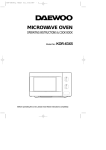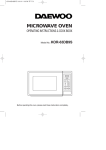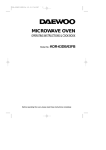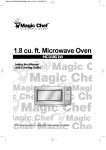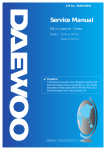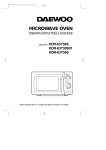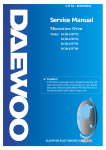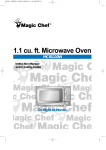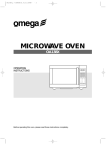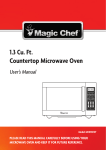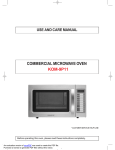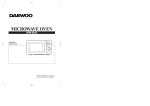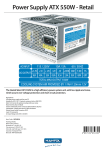Download Daewoo Electronics KOR-63D79S User's Manual
Transcript
MICROWAVE OVEN OPERATING INSTRUCTIONS & COOK BOOK Model No.: KOR-63D79S Before operating this oven, please read these instructions completely. TABLE OF CONTENTS PRECAUTIONS TO AVOID POSSIBLE EXPOSURE TO EXCESSIVE MICROWAVE ENERGY PRECAUTIONS TO AVOID POSSIBLE EXPOSURE TO EXCESSIVE MICROWAVE ENERGY ......................... 1 IMPORTANT SAFETY INSTRUCTIONS ....... 2 FEDERAL COMMUNICATIONS COMMISSION RADIO FREQUENCY INTERFERENCE STATEMENT (U.S.A. ONLY) ........................................... 3 GROUNDING INSTRUCTIONS ............. 4 SAFETY PRECAUTIONS ........................ 5 INSTALLATION........................................ 7 CARE OF YOUR MICROWAVE OVEN SAFETY ...................................................... 8 (a) Do not attempt to operate this oven with the door open since open-door operation can result in harmful exposure to microwave energy. It is important not to defeat or tamper with the safety interlocks. HOW TO USE YOUR MICROWAVE OVEN SAFELY.......................................... 9 OMNI WAVE COOKING SYSTEMTM ........ 10 FEATURES DIAGRAM ......................... 11 (b) Do not place any object between the oven front face and the door or allow soil or cleaner residue to accumulate on sealing surfaces. OPERATING PROCEDURE .................. 12 (c) Do not operate the oven if it is damaged. It is particularly important that the oven door close properly and that there is no damage to the: (1) door (bent), (2) hinges and latches (broken or loosened), (3) door seals and sealing surfaces. SPECIFICATIONS................................... 36 HOW TO SET THE OVEN CONTROLS ...... 13 COOKING GUIDE .................................. 21 BEFORE YOU CALL FOR SERVICE ....... 36 EMERSON LIMITED WARRANTY.... 38 (d) The oven should not be adjusted or repaired by any one except properly qualified service personnel. SAVE THESE INSTRUCTIONS 1 3. Away from radio and TV sets Poor television reception and radio interference may result if the oven is located close to a TV, Radio antenna, feeder and so on. Position the oven as far from them as possible. 4. Away from heating appliance and water taps Keep the oven away from hot air, steam or splash when choosing a place to position it, or the insulation might be adversely affected and breakdowns occur. 5. Power supply • Check your local power source. This oven requires a current of approximately 15 amperes, 220V~240V 50Hz. • Power supply cord is about 0.8 meters long. • The voltage used must be the same as specified on this oven. Using a higher voltage may result in a fire or other accident causing oven damage. Using low voltage will cause slow cooking. We are not responsible for damage resulting from use of this oven with a voltage of ampere fuse other than those specified. • If the supply cord is damaged. It must be replaced by the manufacturer or its service agent or similarly qualified person in order to avoid a hazard. 6. Examine the oven after unpacking for any damage such as: A misaligned door, Broken door, A dent in cavity. If any of the above are visible, DO NOT INSTALL, and notify dealer immediately. 7. Do not operate the oven if it is colder than room termperature. (This may occur during delivery in cold weather.) Allow the oven to become room temperature before operating. 8. The minimum height of free space necessary above the top surface of the oven is 100mm. EARTHING INSTUCTIONS This appliance must be earthed. In the event of an electrical short circuit, earthing reduces the risk of electric shock by providing an escape wire for the electric current. This appliance is equipped with a cord having a earthing wire with a earthing plug. The plug must be plugged into an outlet that is properly installed and earthed. WARNING Improper use of the earthing plug can result in a risk of electric shock. Consult a qualified electrician or serviceman if the earthing instructions are not completely understood, or if doubt exists as to whether the appliance is properly earthed. If it is neceswsary to use an extension cord, use only a 3-wire extension cord that has a 3-blade earthing plug, and a 3-slot receptacle that will accept the plug on the appliance. The marked rating of the extension cord should be equal to or greater than the electrical rating of the appliance. INSTALLATION 1. Steady, flat location This oven should be set on a steady, flat surface. This oven is designed for counter top use only. 2. Leave space behind and side All air vents should be kept a clearance. If all vents are covered during operation, the oven may overheat and, eventually, oven failure. SAVE THESE INSTRUCTIONS 2 4. Set the variable power control to the desired power level. FEATURES SYMBOL 3 4 POWER OUTPUT LEVEL POWER Gentle heating 120W Heat 230W Defrost 310W 400W Low stage 400W 550W Medium 550W 660W Medium high 660W MAX High 770W 5 1 2 1 Glass Cooking Tray 2 Roller guide-This must always be used for cooking together with the glass cooking tray. 5. Set the operating time by turing the timer control to the desired cook time and the microwave cooking starts. • If setting the timer control for less than 2 minutes, turn it past 2 minutes and then back to the desired time. 6. Microwave energy will be turned off auto matically when the timer reaches “OFF”. Then food can be taken out of the oven. • To prevent the oven from operating with the door open, your microwave oven is fitted with safety door interlock switches. • If you wish to inspect the food while it is cooking simply open the door. The oven will automatically stop cooking. To continue cooking, you simply close the door. • If you wish to stop cooking, simply turn the timer knob to the “OFF” position. Cooking can be reset at any time during the cooking cycle by turning the timer control. • Do not let the timer continue to operate after removing or when there is no food. 3 Knob VPC-Used to select a microwave power level. 4 Knob timer-Used in setting cooking time for all functions. OPERATION PROCEDURE This section includes useful information about oven operation. 1. Connect the mains lead to an electrical outlet. 2. After placing the food in a suitable container, open the oven door and put it on the glass tray. The glass tray and roller guide must always be in place during cooking. 3. Shut the door. Make sure that it is firmly closed. When the oven door is opened, the light turns off. The oven door can be opened at any time during operation by pressing the door release button on the control panel. The oven will automatically shut off. 3 COOKING GUIDE COOKING UTENSILS COOKING TECHNIQUES Recommended Use Stirring Glass and glass-ceramic bowls and dishes - Use for heating or cooking. Microwave browning dish - Use to brown the exterior of small items such as steaks, chops, or pancakes. Follow the directions provided with you browning dish. Microwaveable plastic wrap - Use to retain steam. Leave a small opening for some steam to escape and avoid placing it directly on the food. Wax paper - Use as a cover to prevent spattering. Paper towels and napkins - Use for short term heating and covering; they absorb excess moisture and prevent spattering. Do not use recycled paper towels, which may contain metal and can catch fire. Paper plates and cups - Use for short-term heating at low temperatures. Do not use recycled paper, which may contain metal and can catch fire. Thermometers - Use only those labeled “Microwave Safe” and follow all directions. Check the food in several places. Conventional thermometers may be used once the food has been removed from the oven. Stir foods such as casseroles and vegetables while cooking to distribute heat evenly. Food at the outside of the dish absorbs more energy and heats more quickly, so stir from the outside to the center. The oven will turn off when you open the door to stir your food. Arrangement Arrange unevenly shaped foods, such as chicken pieces or chops, with the thicker, meatier parts toward the outside of the turntable where they receive more microwave energy. To prevent overcooking, place thin or delicate parts toward the center of the turntable. Shielding Shield food with narrow strips of aluminum foil to prevent overcooking. Areas that need shielding include poultry wing-tips, the ends of poultry legs, and corners of square baking sdishes. Use only small amounts of aluminum foil. Larger amounts can damage your oven. Limited Use Aluminum foil - Use narrow strips of foil to prevent overcooking of exposed areas. Using too much toil can damage your oven, so be careful. Ceramic, porcelain, and stoneware - Use these if they are labeled “Microwave Safe”. If they are not labeled, test them to make sure they can be used safely. Never use dishes with metallic trim. Plastic - Use only if labeled “Microwave Safe”. Other plastics can melt. Straw, wicker, and wood - Use only for short-term heating, as they can be flammable. Turning Turn foods over midway through cooking to expose all parts to microwave energy. This is especially important with large items such as roatsts. Standing Foods cooked in the microwave build up internal heat and continue to cook for a few minutes after the oven stops. Let foods stand to complete cooking, especially foods such as roasts and whole vegetables. Roasts need this time to complete cooking in the center without overcooking the outer areas. All liquids, such as soup or hot chocolate, should be shaken or stirred when cooking is complete. Let liquids stand a moment before serving. When heating baby food, stir well and test the temperature before serving. Adding Moisture Microwave energy is attracted to water molecules. Food that is uneven in moisture content should be covered or allowed to stand so that the heat disperses evenly. Add a small amount of water to dry food to help it cook. Not Recommended Glass jars and bottles - Regular glass is too thin to be used in a microwave, and can shatter. Paper bags - These are a fire hazard, except for popcorn bags that are designed for microwave use. Styrofoam plates and cups - These can melt and leave an unhealthy residue on food. Plastic storage and food containers - Containers such as margarine tubs can melt in the microwave. Metal utensils - These can damage your oven. Remove all metal before cooking. 4 WEIGHT & MEASURE CONVERSION CHART POUNDS & OUNCES TO GRAMS POUNDS(lb.) 1/4 1/2 3/4 1 2 3 4 5 6 7 8 9 10 11 GRAMS(g) 114 227 341 454 907 1361 1814 2268 2722 3184 3629 4082 4526 4990 FLUID MEASUREMENTS 1 Cup 1 Piny 1 Quart 1 Gallon OUNCES(oz.) 1 2 3 4 5 6 7 8 9 10 11 12 13 14 15 16 = 8 fluid ounces = 16 fluid ounce = 32 fluid ounces = 128 fluid ounces GRAMS(g) 28 57 85 113 142 170 198 227 255 284 312 340 369 397 425 454 = 240ml = 480ml = 960ml = 3840 ml AUTO DEFROSTING GENERAL INFORMATION ➪ Put the food on a microwave rack (roasts, bone-in pieces) or in a microwave casserole (small pieces such as cubes or strips) or weigh at home on a kitchen scale. Round number to the nearest tenth of a pound and choose that number with each item pads. ➪ The shape of food items, especially larger ones, will vary affect the way defrost. Always check the status after the standing time. Fish, seafood and poultry should still be somewhat icy in the center the held under cold running water to finish defrosting. If more time is needed, use DEFROST by time to add time in small increments. ➪ Halfway through the defrosting process, a series of beeps will indicate that it is time to change the position of the item being defrosted. The includes turning over or rotating the item, separating defrosted pieces or sections, or shielding. ➪ Shielding means to use a 2-inch strip of aluminum foil to protect thinner or unevenly shaped part from beginning to cook. Microwave energy will not penetrate the foil. Some rules apply to the use of foil: Do not let the foil pieces touch each other or the sides of the microwave oven. Be sure that all ends are touched under and lie flat to the food. Remember to adjust foil when a item is turned over and cover with wax paper. ➪ To prepare food for freezer storage(and later defrosting), wrap tightly in moisture proof packaging. If using freezer plastic bags, be sure to let all the air out to prevent freezer bump on the food. Package so that food is as evenly shaped as possible ease in defrosting 5 AUTO DEFROSTING CHART FISH AND SEAFOOD ITEM SPECIAL INSTRUCTIONS Fish Fillets Frozen in block Place fillets on a microwave rack; cover paper towel. Turn over after half the time. Let stand 10 minutes then finish with cold running water (about 5 minutes). Individual Fish Place fish on a microwave rack; cover with paper towel. Fillets or Fish Turn over after half the time. Let stand 5 minutes then finish Steaks with cold running water (about 5 minutes). COOKING TIME PER POUND 5 minutes per 1 lbs 5 minutes per 1 lbs PORK ITEM Pork Strips Pork Cubes SPECIAL INSTRUCTIONS Place pork strips on a microwave rack; cover with paper towel. Separate and turn over once. Let stand 20 minutes. Place pork cubes on a microwave rack; cover with paper towel. Separate and rearrange once. Let stand 20 minutes. COOKING TIME PER POUND 9 minutes per 1 lbs 9 minutes per 1 lbs BEEF AND LAMB ITEM Beef Rolled Rump Roast, boneless -OR -Beef Round Sirloin Tip Roast, boneless Ground Beef 1/2 to 1 pound SPECIAL INSTRUCTIONS COOKING TIME PER POUND Place roast (up to 3 pounds) on a glass cooking tray with 13 minutes per paper towel. Turn over after half the time. Shield as needed. 1 lbs Let stand 30 minutes. Place beef on a glass cooking tray with paper towel. Break 10 minutes per apart and remove thawed portions with fork. Let stand 10 1 lbs minutes. POULTRY ITEM Whole Chicken -- OR -Cornish Hen Whole Chicken, Cut up -- OR -Chicken Pieces, Bone- in SPECIAL INSTRUCTIONS Place chicken, breast side down, on a glass cooking tray with paper towel. Turn over after half the time. Shield as needed. Let stand 20 minutes. If needed, finish defrosting under cold running water. Place chicken on a glass cooking tray with paper towel. Separate and rearrange once. Shield as needed. Let stand 15 minutes. If needed, finish defrosting under cold running water. 6 COOKING TIME PER POUND 10 minutes per 1 lbs 10 minutes per 1 lbs MEAT COOKING CHART Meat Microwave power Cooking Time per pound 660W 660W 660W MAX 9-11 min. 10-12 min. 12-14 min. 7-9 min. MAX MAX 3-5 min. 4-6 min. 660W 13-16 min. MAX MAX 3-4 min. 4-6 min. Beef Standing/rolled Rib - Rare - Medium - well done Ground Beef(to brown for casserole) Hamburgers, Fresh or defrosted (4 oz. Each) 2 patties 4 patties Pork Loin, Leg Bacon 4 slices 6 slices NOTE: The above times should be regarded only as a guide. Allow for difference in individual tastes and preferences. The times may vary due to the shape, cut, and composition of the meat. POULTRY COOKING CHART Poultry Microwave power Cooking Time per pound MAX 660W 660W 12-14 min. 10-12 min. 11-13 min. MAX 13-15 min. Chicken Whole Breast(boned) portions Turkey Whole NOTE: The above times should be regarded only as a guide. Allow for difference in individual tastes and preferences. The times may vary due to the shape and composition of the food. FRESH FISH COOKING CHART Fish Fish Fillets Whole Mackerel, Cleaned and Prepared Whole Trout, Cleaned and Prepared Salmon Steaks Microwave Power Cooking Time per pound Method Standing Time MAX 5~7 min. Add 15-30 ml(1-2 Tbsp) 2-3 min. MAX 5~7 min. - 3-4 min. MAX 6~8 min. - 3-4 min. MAX 6~8 min. Add 15~30 ml(1~2 Tbsp) 3-4 min. VEGETABLE COOKING CHART Vegetable artichokes, fresh artichokes, frozen Preparation Quantity Whole Hearts 4(8 oz. each) 9 oz. pkg 7 Cooking Time Standing Time 12-14 min. 10-11 min. 5 min. 5 min. Vegetable Preparation 11/2-in.pieces Whole spears Spears Whole or cut Whole Whole 1/2-in.slices Sliced florets 1/2-in.slices on cob, husked on cob, husked corn, frozen whole kernel cubed eggplant, fresh whole, pierced leeks fresh whole, ends lima beans, frozen whole mixed vegetables frozen mushrooms, fresh sliced okra, frozen sliced onions, fresh whole, peeled pea pods(snow peas), frozen whole peas and carrots parsnips, fresh cubed whole potatoes, white or sweet, fresh whole 1/2-in.slices squash, summer, fresh squash, summer, frozen sliced squash, winter, fresh whole, pierced squash, winter, frozen whipped succotash, frozen turnips cubed asparagus, fresh asparagus, frozen broccoli, fresh broccoli, frozen brussels sprouts, fresh brussels sprouts, frozen carrots, fresh carrots, frozen cauliflower, frozen celery, fresh corn, fresh Quantity 1 lb. 10 oz. pkg 1 lb. 10 oz. pkg 10 oz. tub 10 oz. pkg 1 lb. 10 oz. pkg 10 oz. pkg 1 lb. 4 ears 4 ears 10 oz. pkg 1 lb. 1-11/2 lb. 1 lb. 10 oz. pkg 10 oz. pkg 1 lb. 10 oz. pkg 8-10 small 6 oz. pkg 10 oz. pkg 1 lb. 4(6 oz. eash) 8(6 oz. eash) 1 lb. 10 oz. pkg 11/2lbs. 12 oz. pkg 10 oz. pkg 4 cups Cooking Time Standing Time 9-10 min. 9-11 min. 9-11 min. 9-10 min. 8-10 min. 9-10 min. 10-12 min. 8-10 min. 8-10 min. 9-11 min. 11-13 min. 11-13 min. 9-10 min. 9-11 min. 10-12 min. 10-12 min. 8-10 min. 8-10 min. 7-9 min. 8-10 min. 13-17 min. 7-8 min. 9-11 min. 9-10 min. 13-15 min. 18-20 min. 9-11 min. 8-10 min. 15-17 min. 10-12 min. 9-11 min. 14-16 min. 3 min. 3 min. 3 min. 3 min. 3 min. 3 min. 3 min. 5 min. 5 min. 5 min. 3 min. 3 min. 5 min. 5 min. 3 min. 3 min. 3 min. 5 min. 5 min. 3 min. 3 min. 5 min. 3 min. 5 min. 3 min. 3 min. 5 min. 3 min. 3 min. 3 min. REHEATING CHART Item Appetizers (bite size) Breakfast entrée Entrée Regular TV-style dinner Hearty TV-style dinner Quantity Power Level Cooking Time 2 servings MAX 4-6 min. 4-5 oz. 8-9 oz. MAX MAX 3-5 min. 8-10 min. 21 oz. MAX 11 oz. 17 oz. MAX MAX Special Instruction Heat 12 at time on paper towel lined paper plate or microwave oven roasting rack If containers is 3/4-inch deep, remove foil cover and replace foil tray in original box. 14-17 min. For containers more then 3/4-inch deep, remove food to similar size glass container; 7-9 min. heat, covered. If no top crust stir 9-12 min. occasionally. 8 Item Quantity 2 pieces Fried chicken 4 pieces 6 pieces 2 fillets Fried fresh fillets 4 fillets 1 Pizzas 2 4 5-6 oz. Pouch dinners 10-11 oz. 2 Bagels 4 1 2 Danish 4(6 oz. pkg) 6(13 oz. pkg) Dinner rolls 6 1(1-11/4 oz.) Hard rolls 2 4 Frozen Juice 6 oz. Concentrates 12 oz. Non-Dairy creamer 16 oz. Pancake 10 oz. Frozen vegetables Cheese cake Brownies Pound cake Coffee cake Power Level Cooking Time MAX MAX MAX MAX MAX MAX MAX MAX MAX MAX 550W 550W 550W 550W 550W 550W 550W 550W 550W 550W MAX MAX 550W 550W 5-7 min. 6-8 min. 7-9 min. 3-4 min. 4-6 min. 2-4 min. 4-5 min. 6-7 min. 5-6 min. 9-11 min. 3-4 min. 4-6 min. 1-2 min. 2-3 min. 3-4 min. 4-5 min. 2-3 min. 1-2 min. 11/2-21/2 min. 2-3 min. 1-2 min. 2-5 min. 10-12 min. 5-6 min. Special Instruction Arrange, on paper tower lined paper plate, covered with paper tower Arrange on microwave oven roasting rack. Pierce pouch. Set on plate. Turn over halfway through cooking. Each individually wrapped in paper toweling (for1-2) or arrange on paper plate, cover with paper toweling. Remove lid. If container is foil lined transfer to a pitcher or open carton. Let stand after defrosting. 6 oz. 10 oz. 550W 550W Pierce box, set on plate. If box is foil 8-12 min. wrapped, remove foil. If vegetables are in 10-14 min. pouch, pierce pouch. Let stand 5 min. 17 oz. 13 oz. 103/4 oz. 11-12 oz. 550W 550W 550W 550W 4-5 min. 2-4 min. 11/2-3 min. 3-5 min. 9 Remove from original container. Arrange on a serving plate. Let stadn 5 minutes after cooking(to defrost). Add an additional 1-2 minutes to serve warm. COOKING UTENSILS Utensils should be checked to ensure that they are suitable for use in microwave ovens. Microwave energy is produced by high frequency radio waves. They are reflected from metal, but will pass through most cooking utensils without heating them. As the waves come into contact with the food, they are converted into heat energy. Listed below are the suggested cooking utensils for this microwave oven and when to use them. 1. Dishes with metal trim of any type-should not be used. This will cause sparking. 2. Glass or ceramic heat proof dishes-excellent for microwave cooking. 3. China dishes and plates-without metal trim may be used to cook and heat individual portions of food. 4. Wood or straw-use only for short period, wood contains some moisture and the microwave energy may cause the wood to dry out and crack. 5. Aluminum foil-may be used in very small pieces for shielding only. Any aluminum foil used should never be closer than 2.5 cm from side walls of oven. 6. Plastic-most heat resistant plastic dinnerware may be used for heating food. However polyethylene, melamine, phenol are unsuitable for use in the oven. They become hot in the microwave. 7. Wax paper-use as a cover to avoid spatters. 8. Metal-In general, metal utensils should not be used in microwave oven. CARE AND CLEANING Although your oven is provided with safety features, it is important to observe the following: 1. It is important not to defeat or tamper with safety interlocks. 2. Do not place any object between the oven front face and the door or allow residue to accumulate on sealing surfaces. Wipe the sealing area frequently with a mild detergent, rinse and dry. Never use abrasive powders or pads. 3. When opened, the door must not be subjected to strain, for example, a child hanging on an opened door or any load could cause the oven to fall forward to cause injury and also damage to the door. Do not operate the oven if it is damaged, until it has been repaired by a trained service technician. It is particularly important that the oven closes properly and that there is no damage to the: i) Door (bent) ii) Hinges and Hookes (broken or loosened) iii) Door seals and sealing surfaces. 4. The oven should not be adjusted or repaired by anyone except a properly trained service technician. BEFORE YOU CALL FOR SERVICE Refer to the following checklist, you may prevent an unnecessary service call. • The oven doesn’t work : 1. Check that the power cord is securely plugged in. 2. Check that the door is firmly closed. 3. Check that the cooking time is set. 4. Check for a blown circuit fuse or tripped main circuit breaker in your house. • Sparking in the cavity; 1. Check utensils. Metal containers or dishes with metal trim should not be used. 2. Check that metal skewers or foil does not touch the interior walls. If there is still a problem, contact the service station. QUESTIONS AND ANSWERS * Q : I accidentally ran my microwave oven without any food in it. Is it damaged? * A : Running the oven empty for a short time will not damage the oven. However, it is not recommended. * Q : Can the oven be used with the glass tray or roller guide removed? * A : No. Both the glass tray and roller guide must always be used in the oven before cooking. * Q : Can I open the door when the oven is operating? * A : The door can be opened anytime during the cooking operation. Then microwave energy will be instantly switched off and the time setting will maintain until the door is closed. * Q : Why do I have moisture in my microwave oven after cooking? * A : The moisture on the side of your microwave oven is normal. It is caused by steam from cooking food hitting the cool oven surface. * Q : Does microwave energy pass through the viewing screen in the door? * A : No. The metal screen bounces back the energy to the oven cavity. The holes are made to allow light to pass through. They do not let microwave energy pass through. DO NOT ATTEMPT TO SERVICE THE OVEN YOURSELF ! 10 SPECIFICATIONS POWER SUPPLY POWER CONSUMPTION MICROWAVE OUTPUT POWER FREQUENCY OUTSIDE DIMENSIONS CAVITY DIMENSIONS NET WEIGHT TIMER POWER SELECTIONS 220V~240V 50HZ, SINGLE PHASE WITH EARTHING 1200 W 700 W 2450 MHZ 465 X 279 X 364 mm 290 X 220 X 306 mm APPROX. 12.5 Kg 35 MIN. DUAL SPEED 7 LEVELS * Specifications are subject to change without notice. IMPORTANT The wires in this mains lead are coloured in accordance with the following code. Green-and-yellow : Earth Blue : Neutral Brown : Live As the colours of the wires in the mains lead of this appliance may not correspond with the coloured markings identifying the terminals in your plug, proceed as follows: The wire which is coloured green-and-yellow must be connected to the terminal in the plug which is marked with the letter ‘E’ or by the earth symbol or green-and-yellow. The wire which is coloured blue must be connected to the terminal which is marked with the letter ‘N’ or coloured black. The wire which is colured brown must be connected to the terminal which is marked with the letter ‘L’ or coloured red. WARNING: This appliance must be earthed. 11












